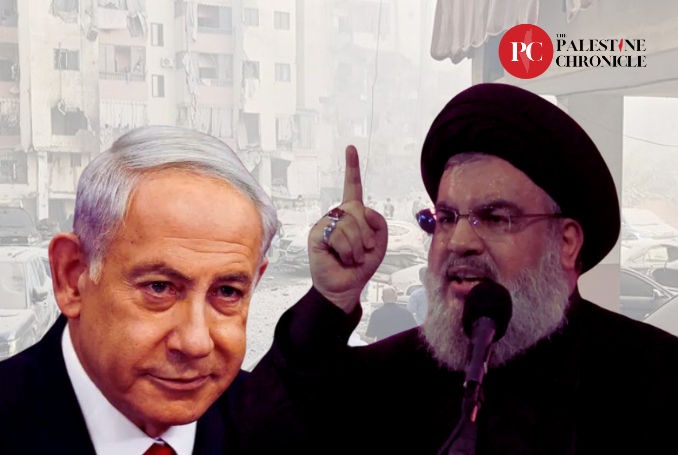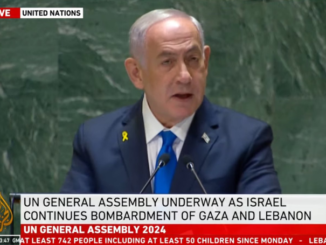
By Palestine Chronicle Editors
The answers to these questions and others will determine the next chapter of the war and the future of the Middle East.
The initial casualty count of the latest Israeli aggression on Lebanon on Friday was 12 dead and 66 wounded, including nine in critical condition.
It is expected to grow.
Explosions rocked the Lebanese capital, Beirut, on Friday afternoon when an Israeli drone targeted a residential building in the city’s southern suburb.
Lebanese media, including Al-Mayadeen, said that four missiles were used in the Israeli attack.
The destruction in Beirut followed several dramatic days in Lebanon where thousands of communication devices – mainly pagers and walkie-talkies – exploded over two consecutive days, but at the exact same time throughout the country.
In a speech on Thursday, Hezbollah’s leader Hassan Nasrallah said that the Lebanese Resistance response will be “in what you will see, not in what you will hear” and that the Resistance will target Israel’s “tightest circle”.
That speech, however, was a response to the killing of scores of Lebanese and the wounding of thousands, as a result of the Israeli intelligence detonation of communication devices in the previous two days.
Israel, however, did not wait for Hezbollah’s response by, once more, took the initiative by attacking Beirut.
The Israeli army claims that it has killed Ibrahim Aqil, Hezbollah’s top operations commander, and many other top leaders in the Radwan’s fighting forces.
(Click here to learn more about Hezbollah’s military capabilities and the Radwan forces.)
The Israeli message is clear, as Israeli Prime Benjamin Netanyahu has essentially presented Hezbollah with only two options: lower your political ceiling by distancing yourself from Gaza, or get ready for an all-out war.
But why did Netanyahu decide to escalate after nearly one year of military conflict at the Lebanon-Israel border?
The answer lies in Gaza.
It is clear that Netanyahu has reached the conclusion that there can be no military victory in the Strip. To distract from his failures at the southern front, he decided to climb an even higher tree, a war in Lebanon.
It is also possible that Netanyahu is under the impression that Iran – Hezbollah’s main supporter – is politically vulnerable in the sense that it is trying to avoid a regional conflict at any cost.
Indeed, Netanyahu has tried to lure Iran into a war that would naturally involve his greatest backer, the United States, by assassinating the top political leader of Hamas, Ismail Haniyeh in Tehran on July 31.
Haniyeh’s assassination was followed by a major military build-up by Washington in the region, in anticipation of an Iranian response.
The response is yet to take place, and several US aircraft carriers and navy destroyers have already left the region.
Netanyahu then turned his gaze to Lebanon.
The pagers’ massacre on September 17 and 18 was meant to be the start of the war. In fact, it might have been.
However, by not waiting for a Hezbollah response, as was the case following Israel’s assassination of the group’s top commander Fouad Shukr on July 30, Israel wanted to send a message that the old ‘rules of engagement’ have been irreversibly crossed.
Hezbollah, of course, will respond. But important questions remain:
Since Israel has crossed all the red lines in its war with Hezbollah, how will the group react to the bloody Israeli escalation?
Hint: By not reacting, and swiftly so, Israel will be emboldened to hit Lebanon even harder.
Moreover, will the ‘axis of resistance’ become involved in a coordinated response, or will the retaliation be left to Hezbollah alone?
?AL-MAYADEEN: An Israeli raid with 4 missiles targeted a residential apartment in the Al-Qaim neighborhood in the southern suburb of Beirut. Details are emerging.
FOLLOW OUR LIVE BLOG https://t.co/Kup8X6ynJv pic.twitter.com/TkAoXYU7ln
— The Palestine Chronicle (@PalestineChron) September 20, 2024
Hint: A coordinated response would present Israel with a far greater challenge and would disorient the Israeli military on all fronts.
And finally, how will Iran proceed now that Israel has made a decision to go to war in Lebanon?
Hint: If Iran does not take a greater initiative, its status and power in the region will certainly be compromised.
The answers to these questions and others will determine the next chapter of the war and the future of the Middle East.
(The Palestine Chronicle)








Israel has to be dissolved if humanity is to be restored in the region. This is the only way and must be the last war in which Palestine can be restored. This history has been leading to this inevitability.